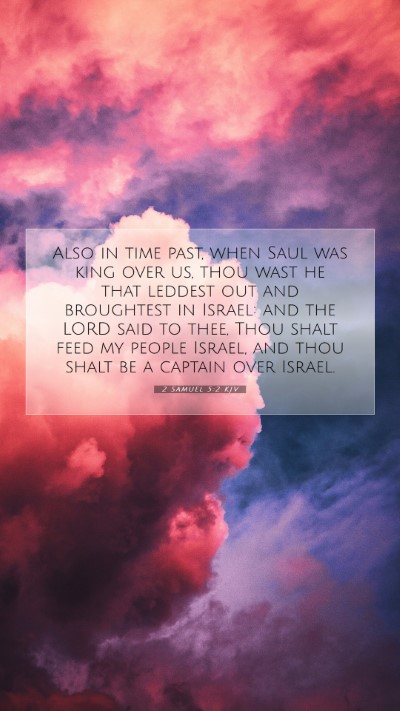Understanding 2 Samuel 5:2
2 Samuel 5:2 states:
"Also, in time past, when Saul was king over us, you were the one who led Israel out and brought them in; and the Lord said to you, 'You shall shepherd My people Israel, and be ruler over Israel.'"
Bible Verse Meanings and Interpretations
This verse marks a pivotal moment in the history of Israel as David is proclaimed king. The collective acknowledgment of David's leadership role by the people highlights his previous contributions and God's calling upon him. Below are insights gathered from various public domain commentaries:
Matthew Henry's Commentary
Matthew Henry emphasizes that this verse reflects the recognition of David's past leadership during the tumultuous times under Saul. He highlights that the people admired David’s role as a military leader and the divine appointment he received from God. Henry notes:
- Faltering Leadership of Saul: Saul failed to unite and lead effectively, making David's leadership more pronounced.
- God’s Call: God’s choice of David foreshadows a shepherd-like role, symbolizing care and guidance for the people.
- Unity Among Israel: The coming together of the tribes to David symbolizes a unification of Israel under one anointed king.
Albert Barnes' Commentary
Albert Barnes elaborates on the significance of the verse in terms of Israel’s governance and prophetic fulfillment. He notes the following points:
- Recognition of David: The leaders acknowledge David’s past deeds as justification for his kingship, highlighting his legitimacy and divine right.
- Prophetic Assurance: The reference to God’s command to David reiterates the path that David must follow as a leader chosen by God.
- Call to Shepherd: The metaphor of shepherding underscores the nature of leadership designed to protect and guide the people.
Adam Clarke's Commentary
Adam Clarke provides a detailed analysis of the historical context of David's rise to kingship. His insights include:
- Historical Context: Understanding the political landscape during Saul’s reign and how David’s leadership emerged as a necessity for Israel.
- Significance of Unity: The gathering of tribes symbolizes the beginning of a new united monarchy in Israel.
- Character of Leadership: Clarke points out that the qualities of shepherding include guiding, nurturing, and providing for the people—qualities that David is called to embody.
Applications and Significance
The significance of 2 Samuel 5:2 extends beyond its immediate context, offering profound lessons for modern believers:
- Recognizing God’s Call: Just as David was called to his leadership, so too are individuals today called to serve in various capacities.
- The Role of Shepherding: Leadership is not just about authority, but about caring for those one is called to lead, reflecting Christ’s teachings.
- Unity in Diversity: The unification of Israel under David serves as a timeless reminder that diverse groups can come together under mutual leadership.
Cross References
This verse is related to several other scripture passages, including:
- 1 Samuel 16:12-13: God’s anointing of David as king.
- Psalms 78:70-72: A reflection on David as a shepherd of Israel.
- 1 Chronicles 11:1-3: The anointing of David as king over all Israel.
Conclusion
In conclusion, 2 Samuel 5:2 encapsulates significant themes of leadership, divine appointment, and unity within the people of Israel. For those engaged in Bible study insights, studying this verse through the lens of historical context, Biblical exegesis, and scripture analysis serves as a valuable exercise. Through understanding its meanings, interpretations, and significance, believers can draw lessons applicable to their daily lives.


